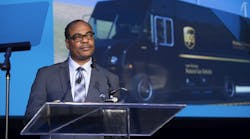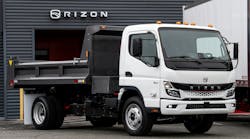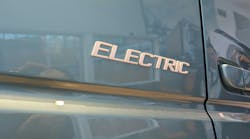LONG BEACH, CA. Once described as brown on the outside and green on the inside, UPS delivery vans and the rest of company’s 100,000 vehicles have made great progress in moving to cleaner alternative fuels over the last decade. “But for all that progress, we still have unfinished business to attend to and we have to move even faster than we have in the past,” according to Carlton Rose, president of global fleet maintenance and engineering for UPS.
Delivering the keynote address at the Advanced Clean Transportation Expo, Rose said UPS currently has 6,800 vehicles running on alternative power sources that include CNG, LNG, propane, electric and hydraulic hybrid combinations, and batteries. “We expect to hit the one-billion-mile mark [with those alternative fuel vehicles] by the end of next year,” he said.
Urging the fleets at ACT Expo to “embrace creating a cleaner, healthier world with creativity and urgency,” Rose pointed to the concept of shared value. “The needs of business and society are the same,” he said. “One supports the other, one needs the other, and neither thrives unless both do.”
Turning to specific technologies, Rose said UPS is confident that natural gas will be “a long-term player” in commercial transportation, and has just opened 12 new CNG fueling stations. He also has high hopes for renewable natural gas which not only reduces tailpipe emissions, but captures methane now being vented into the atmosphere.
Turning waste into biodiesel is another technology UPS is investing in. At present the company “can’t get enough of it,” but it has made significant long-term purchase commitments to help seed development efforts.
UPS is also enthusiastic about electric power, either in hybrid powertrains or straight battery power. Recalling that UPS ran a fleet of electric package vans in New York City from 1930 into the 1960s, Rose said that today it has 330 electric hybrids and is witnessing promising advances in battery technology. He also announced at the meeting that 125 hybrid electric vans built by Workhorse for UPS where in the process of being updated with a new powertrain that would increase their range, performance and fuel economy.
Government also needs to do its part to help speed up the transition to cleaner transportation, according to Rose. “Collaboration is the only way we can get to where we need to go,” he said. “Policy and progress go hand in hand. Without incentives and other government support, we wouldn’t be having this conversation today, but industry still need much more help.”
And while fleets might chaff at clean air and emissions regulations, they should also recognize “that innovation comes from reaction to these regulations,” Rose said. “We in the transportation industry just need to stay informed and to stay ahead of any regulatory change.”
Calling for continued commitment from the transportation industry, Rose said in closing his keynote, “We must continue to evolve – all of us – to create a cleaner, healthier world. And we must embrace this challenge with creativity and urgency.”



